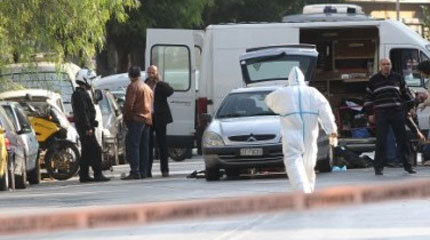by Sylvia Poggioli, NPR
Greece halted overseas shipments and screened outgoing mail and packages Wednesday following the discovery of 14 parcel bombs that were mailed to foreign governments and embassies.
Two Greek men in their 20s have been arrested, and authorities say all evidence suggests this is a case of domestic terrorism and is not linked to the parcel bombs sent to the U.S. from Yemen.
There has been only one casualty since Monday, when a courier employee was slightly injured after a bomb exploded in her hands.
But the explosive parcels have triggered international concern and prompted Greece’s 48-hour ban on all package deliveries abroad.
Symbolic Action
Most of the mail bombs were sent to targets in Greece, but two were sent to the leaders of Germany and Italy. Both were intercepted.
Investigators say none of the devices examined so far contained lethal amounts of explosives, unlike those used by Yemeni militants. Authorities say the mail bombs are not part of an international terrorist action, but purely domestic.
Brady Kiesling, a former U.S. diplomat who studies Greek political violence, says the mail bombs are part of a symbolic action, not aimed at causing harm.
“The anarchists are very anti-state in any form,” he says. “Embarrassing the government of Greece is something they’re happy to do. It’s very much a response to acts of police and government repression — quote unquote — of anarchists.”
‘Uniquely Greek’
Greece has been living for six months under extremely tough austerity measures imposed by the government of Prime Minister George Papandreou to deal with the country’s huge debt. Hardly a day goes by without a street protest.
Achilles Peklaris, political correspondent for the alternative weekly The Athens Voice, says Greece is accustomed to domestic violence by the young.
“Some of them throw stones,” he says. “Some of them throw Molotov bombs. Some of them go squatting [in] buildings. Some of them make package bombs. It is something — I would call it uniquely Greek.”
The roots of Greek anarchism go back to the civil war in the 1940s and reaction to the military junta in the 1970s, which sowed the seeds of a polarized society. In recent years, Greece has been rocked by youth riots against perceived police brutality.
And currently, youth unemployment is running at over 30 percent.
Winning Popular Opinion
Peklaris says a traditional diffidence toward the central state has increased with the revelation of widespread political corruption.
“This is the fuel of terrorism in Greece, that people do not trust the Greek state — they hate the police,” he says. “Whoever turns against them is going to be liked by a big part of public opinion.”
Observers say a traditional benevolence shown by Greek society toward violent protests against the state has been deepened by the economic and social crisis.
This will make it even harder for authorities to crack down against the anarchist groups believed to be behind the mail bombs. But the government has vowed it will be merciless.



















